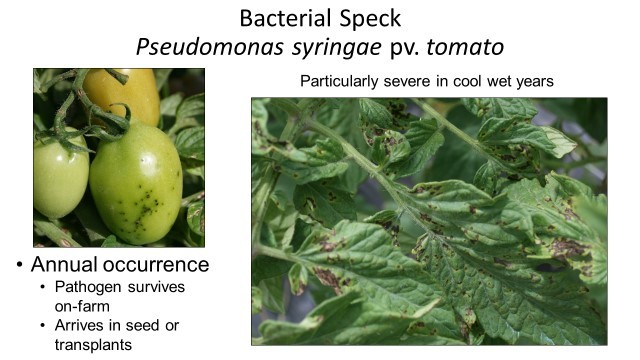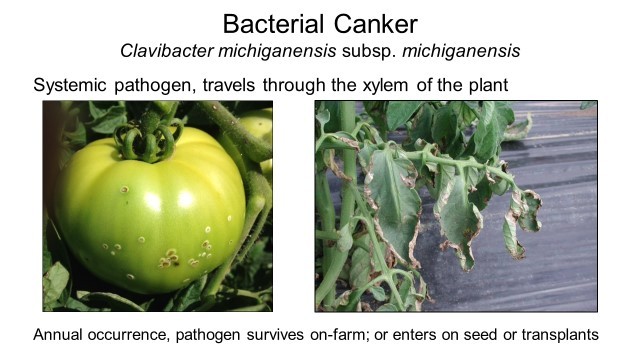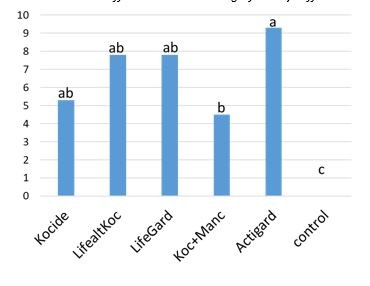Start managing for bacterial diseases in field tomatoes at transplanting
Crystal Stewart-Courtens, Extension Vegetable Specialist
Eastern New York Commercial Horticulture
Bacterial speck, spot, and canker continue to be perennial problems in Eastern NY. We are learning that effective management is a season-long effort, starting with proper greenhouse sanitation and continuing with regular plant protection. The good news is that there are more tools available for disease management than once thought; the bad news is management is more intensive than we'd like.

Source: Dr. Christine Smart

Source: Dr. Christine Smart
Start with clean stakes
This is a best practice because of other tomato diseases too, so hopefully you are already cleaning your tomato stakes. Every year wooden and metal stakes should be power-washed to remove excess soil, then sterilized using either bleach, Green-Shield, Xero-Tol, or an equivalent product. It is important for the stakes to sit in a sterilizing solution long enough to penetrate the nooks and crannies of the wood and kill any lurking bacteria or fungal structures. Remember that bleach will damage metal stakes if not rinsed off.
Protect plants starting early
Bacterial diseases are most effectively controlled by preventing their infection. It's not always clear where inoculum comes from, but we know that growers who have struggled with bacterial diseases in the past are having some success with starting a protective spray program shortly after transplanting. The traditional spray for both organic and conventional growers has been copper; however, there is concern about applying the amount of copper per season that would be needed to provide continuous control. Dr. Christine Smart has been doing trialing of alternatives to copper for bacterial canker and bacterial speck, and has found that there are products equally effective to copper available on the market.
2017 Bacterial Speck Trial Results: Dr. Smart
*Products with the same letter are not significantly different
Treatment and Rate/A
Active Ingredient
Mean AUDPC
(disease over time)
Unsprayed control
234.8 a
Regalia EC 4 qt
Reynoutria sachalinensis extract
174.5 b
Double Nickel LC 32 fl oz
Bacillus amyloliquefaciens
166.3 b
Actinovate AG 12 oz
Streptomyces lydicus
161.3 b
LifeGard WG 4.5oz/100 gal
Bacillus mycoides
153.8 b
Actinovate AG+Regalia EC
150.0 b
Champ 30 WG 2.0 lb
Copper hydroxide
145.0 b
2017 Bacterial Canker Trial: Dr. Smart
# of fruit without lesions
*Products with different letters are significantly different

It's important to protect leaves because fruit quality will decrease as the plant weakens and is defoliated. However, fruit quality is downgraded by just one lesion. According to Dr. Smart, bacterial infection of fruit occurs before it reaches ping-pong size. Keeping fruit protected prior to this point will effectively result in lesion-free fruit. This knowledge may adjust timing of sprays.
Because copper and other products such as Actigard have, on average across bacterial diseases, equal efficacy, alternating between them could help with resistance management and will reduce copper loading the in soil. All of these products wash off in rains, so protecting weekly or between rain events is recommended for best results with field tomatoes.
One quick note—you will notice that none of the products listed are antibiotics. There are no antibiotics listed for vegetable production—products listed are either broad spectrum biocides, such as copper, stimulate plant immunity, such as Regalia and LifeGard, or competitively colonize the leaf and suppress other bacteria, such as the Bacillus products.

Upcoming Events
2026 Northeast Extension Fruit Consortium Winter Webinar Series
February 4, 2026 : Management of Up and Coming Strawberry Diseases in the Northeastern United States
Session 1: Management of Up and Coming Strawberry Diseases in the Northeastern United States
February 11, 2026 : Kiwiberry Production in the Northeast
Session 2: Kiwiberry Production in the Northeast
February 18, 2026 : Heat Mitigation- Sunburn and Fruit Coloring
Session 3: Heat Mitigation- Sunburn and Fruit Coloring
February 25, 2026 : The Dating Game- Updates in Lepidopteran Mating Disruption
Session 4: The Dating Game- Updates in Lepidopteran Mating Disruption
March 4, 2026 : USEPA Endangered Species Act Strategies and Pesticide Use
Session 5: USEPA Endangered Species Act Strategies and Pesticide Use
March 11, 2026 : Practical Drought Management for Fruit Growers
Session 6: Practical Drought Management for Fruit Growers
Managing the Invasive Swede Midge Webinar
March 6, 2026 : Managing the Invasive Swede Midge Webinar
Swede midge is an invasive fly that causes serious economic losses to brassica crops. Due to its small size and hidden feeding habits, swede midge is often called an "invisible pest" and damage may be misdiagnosed. In this webinar, we will review the swede midge life cycle and crop damage symptoms, current management recommendations, new research findings, and highlights from on-farm case studies with a focus on organic management.
New Farm Manager Skills Day - Get the Tools You Need to Grow Your People (Hudson Valley)
March 10, 2026 : New Farm Manager Skills Day - Get the Tools You Need to Grow Your People
Millbrook, NY
Are you moving into a supervisory farm management role this season and want to get off to a good start? Are you an experienced manager who wants to connect with other "people" managers and work on your skills? This one-day workshop is for you!












































